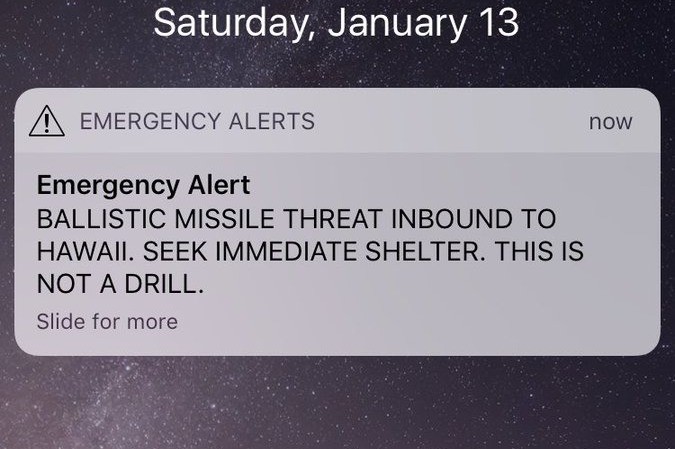What did the Hawaiian Missile False Alarm teach us about a zombie apocalypse?
5 lessons from the Ballistic Missile Alert in Hawaii
On Saturday, January 13th, 2018 citizens of Hawaii had a big scare when a false alert went out over thousands of phones claiming a nuclear attack was imminent.

This mistake rattled over one million people as the ominous message was spewed out over social media. It caused a lot panic and confusion as people scrambled to respond. Drivers abandoned cars, and others simply resigned themselves to fate and waited for the attack to commence.
One video has surfaced of a man placing his daughter into a storm drain.
BREAKING VIDEO: Footage shows children being placed into storm drains immediately after Emergency Ballistic Missile Warning was sent to residents in Hawaii. pic.twitter.com/PJ2xzvJdLL
While there is no doubt that zombie obsession has taken over many, the Hawaiian missile alert has been a powerful wakeup call for many. What lessons can be learned about our levels of preparation for a zombie attack? If zombies aren’t ‘your thing’, just substitute your disaster of choice and the results will be the same. That could be an asteroid impact on the earth’s surface, a highly contagious and deadly disease epidemic, or in this case, an imminent nuclear strike.
Zombies are not racist.
The walking dead don’t care which car you drive, the clothes you wear, the number of bathrooms in your house, your religion, your sexual preference, or the size of your bank account. A zombie will attack anyone at anytime. It doesn’t matter who are in life, you may be randomly selected for death.
The vast majority of the public is completed unprepared for a zombie attack.
Here are some of the quotes from local Hawaiians involved in the fiasco:
“I kind of was…. like a deer in the headlights.”
“Terrifying. I had no idea what to do.”
“Ran to find bomb shelter but were told it was bolted shut.”
BREAKING FOOTAGE: Video shows some of the panic at the University of Hawaii after a missile attack warning was mistakenly issued earlier. pic.twitter.com/pvhKKeVO9V
There are response teams in place, but they are not as rapid as they claim.
The local government of Hawaii did respond and get the false alarm shut down, but it took at least 40 mins by some accounts. In the era of instant communication (see the next lesson note) the public expects nearly instantaneous reaction times from emergency service provders. This isn’t the case, but there are plans and people that ready to respond to disasters.
Social Media has gotten completely out of control.
At the onset of a zombie attack, people would attempt to contact each other through social media and verify what is happening, the best ways to deal it and what their favorite celebrities had to say about it. #prayforzombies. This idea, of social commentary illuminating an absurd aspect of modern life, is precisely what director George Romero was stating with his pivotal film, Dawn of the Dead. Even with the threat of a nuclear missile inbound, people STILL chose to turn to their cell phones and social media for support. The Black Panthers once said, “The revolution will not be televised.” That may be true, but you can be damn sure it will be Tweeted.
We have a lot to learn from our elders.
In the wake of the Hawaiian missile false alarm, the island paradise has revived the usage of Cold War sirens, reports the Associated Press. While, we’re not advocating the ‘duck and cover’ method of hiding beneath your desk is the best way to survive a zombie holocaust, it’s worth mentioning that there are some very hard learned lessons passed down from prior generations. We would we be wise to heed their warnings and absorb the information from individuals who lived through them.
